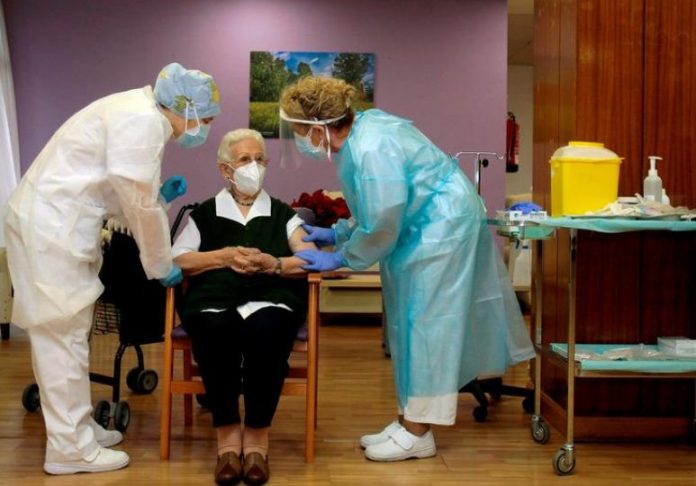Europe launched a mass COVID-19 vaccination drive on Sunday with pensioners and medics lining up to get the first shots to see off a pandemic that has crippled economies and claimed more than 1.7 million lives worldwide.
“Thank God,” 96-year-old Araceli Hidalgo said as she became the first person in Spain to have a vaccine at her care home in Guadalajara, near the capital Madrid.
“Let’s see if we can make this virus go away.”
In Italy, the first country in Europe to record significant numbers of infections, 29-year-old nurse Claudia Alivernini was one of three medical staff at the head of the queue for the shot developed by Pfizer and BioNTech.
“It is the beginning of the end … it was an exciting, historic moment,” she said at Rome’s Spallanzani hospital.
The region of 450 million people is trying to catch up with the United States and Britain, which have already started vaccinations using the Pfizer shot.
The European Union is due to receive 12.5 million doses by the end of the year, enough to vaccinate 6.25 million people based on the two-dose regimen. The companies are scrambling to meet global demand and aim to make 1.3 billion shots next year.
The bloc has secured contracts with a range of drugmakers besides Pfizer, including Moderna and AstraZeneca, for a total of more than two billion vaccine doses and has set a goal for all adults to be inoculated during 2021.
With surveys pointing to high levels of hesitancy towards the vaccine in countries from France to Poland, leaders of the 27-country European Union are promoting it as the best chance of getting back to something like normal life next year.
“We have a new weapon against the virus: the vaccine. We must stand firm, once more,” tweeted French President Emmanuel Macron, who tested positive for the coronavirus this month and left quarantine on Christmas Eve.
But Ireneusz Sikorski, 41, leaving church in the Polish capital of Warsaw, was sceptical.
“I don’t think there’s a vaccine in history that has been tested so quickly,” he said. “I am not saying vaccination shouldn’t be taking place. But I am not going to test an unverified vaccine on my children, or on myself.”
Distribution of the shot presents tough challenges as the vaccine uses new mRNA technology and must be stored at about -70 degrees Celsius (-112°F).
In Germany, the campaign faced delays in several cities after a temperature tracker showed that about 1,000 shots may not have been kept cold enough during transit.
BioNtech said it was responsible for the shipment to the 25 German distribution centres and that the federal states and local authorities were responsible for the shipment to the vaccination centres and the mobile vaccination teams.
“This is where the variations in temperature occurred. We are in contact with many authorities to provide advice, however it is up to them how to proceed”, a spokeswoman said.
Authorities in Bavaria’s Upper Franconia region, one area that had been affected, later said BioNTech had cleared the vaccines.
“BioNTech has confirmed the quality of the vaccine shots,” a spokeswoman said. “The vaccination programme can start (in our region).”
The Pfizer shots being used in Europe were shipped from its factory in Puurs, Belgium, in specially designed containers filled with dry ice. They can be stored for up to six months at Antarctic winter temperatures, or for five days at 2C to 8C, a type of refrigeration commonly available at hospitals.
In Italy, solar-powered healthcare pavilions designed to look like five-petalled primrose flowers – a symbol of spring – sprouted in town squares as the vaccination drive kicked off.
Portugal has been establishing separate cold storage units for its Atlantic archipelagos of Madeira and the Azores.
German pilot Samy Kramer celebrated the vaccination campaign by tracing out a giant syringe in the sky. He flew 200 km (125 miles), following a syringe-shaped route that showed up on internet site flightradar24.
‘FIRST MAN ON THE MOON’
The vaccination drive is all the more urgent because of the concern around new variants of the virus linked to a rapid expansion of cases in Britain and South Africa.
“We know that the pandemic won’t just disappear as of today, but the vaccine is the beginning of the victory over the pandemic, the vaccine is a ‘game changer’,” said Austrian Chancellor Sebastian Kurz.
Cases of the UK variant have been detected in Australia, Hong Kong and in Europe, mostly recently in Sweden, France, Norway and Portugal’s island of Madeira. So far, scientists say there is no evidence to suggest the vaccines developed will be any less effective against the new variants.
While Europe has some of the best-resourced healthcare systems in the world, the scale of the effort means some countries are calling on retired medics to help while others have loosened rules for who is allowed to give the injections.
Beyond hospitals and care homes, sports halls and convention centres left vacant by lockdown restrictions will become venues for mass inoculations.
Vaccinations also started in Norway, which is not a member of the EU bloc.
“I feel like a historical figure … almost like the first man on the Moon,” said care home resident Svein Andersen, 67, as he received the country’s first shot in the capital, Oslo.
But even then, Hungary on Saturday jumped the gun on the official roll-out by administering shots to frontline workers at hospitals in the capital Budapest. The Netherlands said it will not start vaccinating until Jan. 8.
Slovakia also went ahead with some inoculations of healthcare staff on Saturday and in Germany, a small number of people at a care home were inoculated a day early too.
Source – Reuters
















